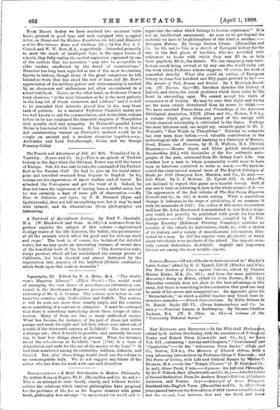From Messrs. Seeley we have received two excellent little books,
printed• in good type and each equipped with acapital •
index, on Nicias and the Sicilian Expedition as. 6d.) and' Hanntbal and the War between Rome and. Carthage (2s.), by the Rev. A. J. Church and W. W. How, MA., respectively. Intended primarily to meet the needs of intelligent boys in the upper forms of schools, they fully realise the modest aspiration expressed by one of the authors that his narrative " may also be acceptable to older readers unaffiicted by the dread of examinations." Hannibal has long been regarded as one of the most fascinating figures in history, though alone of the great conquerors be left behind no work that has stood the test of time, and Mr. How's appreciation of his military genius and statesmanship is marked by an eloquence and enthusiasm not often encountered in a school text-book. Nicias, on the other hand, as Professor Church truly observes, " is the most blameless as he is the most pathetic in the long list of Greek statesmen and soldiers," and it is well to be reminded that Aristotle placed him in the very front rank of patriots. As a narrator Professor Church's merits are too well known to call for commendation, and in the little volume before us he has condensed the immortal chapters of Thucydides with notable skill and sympathy. In Plutarch's parallel Lives Nicias is bracketed with Crasaus. It has occurred to us that a not uninteresting variant on Plutarch's method would be to couple an ancient and a modern character together,—e.g., Alcibiades and Lord Peterborough, Nicias and Sir George Pomeroy-Colley.






































 Previous page
Previous page